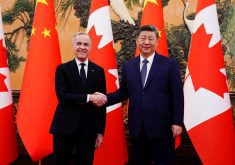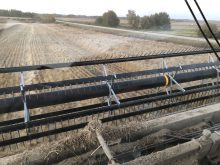Typically, when one hears ‘Canada’ and ‘slavery’ in the same sentence, it’s because the country is fighting it internationally.
For example, the country intends to implement the Modern Slavery Act in January, aimed at fighting forced labour and child labour in global supply chains.
That’s why the recent words of a UN special rapporteur were a bit of a blow to the national ego.
Read Also

Trade uncertainty is back on the Canadian national menu
Even if CUSMA-compliant goods remain exempt from Trump’s new tariffs for now, trade risk for farmers has not disappeared, Sylvain Charlebois warns.
Tomoya Obokata, a professor of international law and human rights and an expert in transnational organized crime, human trafficking and modern slavery, said Canada’s temporary foreign worker systems are ready-made for abuse. He went so far as to say they were “a breeding ground for contemporary forms of slavery.”
Reaction to his comments was predictably divided.
Advocacy groups for migrant worker rights lauded Obokata, saying he confirmed what they’ve known for years.
Grower groups were less impressed, noting it was unfair to make overly broad generalizations of farmers.
The main criticism seems to be that work permits are tied directly to a single employer.
There are reasons for that. Recruiting and bringing workers to Canada isn’t cheap or easy. But it does set up a one-sided dynamic.
I’ve had bosses that I didn’t enjoy over the years. Sometimes I bit my tongue, reminded myself that they call it ‘work,’ not ‘fun,’ for a reason and got to it. Other times I called them on whatever the sticking point was and we found a solution that worked for both of us.
On few occasions, I quit and found something else to do with my time and energy that paid my bills. To be clear, if I wasn’t meeting their needs, they had the same right as I did to sever the relationship.
That’s a functioning labour market at work. Everyone is a willing participant and, if they don’t like it, they can move along.
But a TFW is in a different and entirely more precarious position. Finding another employer isn’t as simple as going down the road to the next farm — though if ag’s labour market is as tight as touted, they’d no doubt get hired.
Quitting and going home isn’t simple either. Home is likely thousands of kilometres and dollars away, and they may still owe someone the costs of getting here.
If they’re in rural Canada, how do they get to an airport, perhaps hundreds of miles away in an urban centre, without transportation?
One by one, these issues stack up until the employer has all the poker chips, regardless of their good intentions. That’s all fine, if it’s an honourable employer who simply wants an honest day’s work for a fair wage.
Unfortunately, as several high-profile incidents have highlighted, that’s not always the case. In any group of people, there will be a subset who don’t act honourably unless they’re forced to.
This is where government must step in. It has to be the rules setter, the arbitrator and the police, when necessary. Its role is to ensure that this policy doesn’t spin off unintended consequences and bad behaviour.
Bad headlines are often the result when it fails.
Canada had long been a producer of premium high-quality food products. A big part of that has been our clean image.
Japan, which takes about $4.3 billion worth of our agricultural products each year, is known as a country of wide-open spaces and a clean environment. Allegations of near slavery surely don’t match what they want in a trading partner.
This is Canada’s first truly public and high-profile black eye on the issue, and it should serve as a wakeup call for any employer dependent on temporary foreign workers, regardless of their sector.
These employers should demand more rigorous government oversight, because the ability for their much-needed employees to come to Canada is entirely dependent on the political goodwill of other Canadians.
It’s written right into the name of the program — temporary. Those work permits have to be signed every year before the workers can arrive.
Canada’s self-image, accurate or not, is that it’s a nice country, full of nice folks. Shake that identity enough and, at some point, the results might not be pretty if you need to hire a foreign worker.















